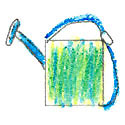Benefits of School Gardens
School gardens may offer benefits to you and your students that go beyond the classroom. School gardens provide the opportunity for students, teachers, and possibly members of the community to interact. This interaction may allow for an improvement of interpersonal social skills and can teach students how to work cooperatively with each other and their elders.
Without proper care and maintenance, gardens can die or become overgrown. Giving students the responsibility to water and care for the plants they grow may instill in them a sense of accountability. Patience is another virtue that students may learn through garden participation, as plants do not grow, flower, or fruit overnight.
As the garden grows and becomes fruitful and beautiful, students can take pride in the efforts they put forth. This pride can help bolster self-esteem and allow students to take pride in the beautification of their school. In this age of urbanization, children's contact with nature is diminishing.
A school garden allows students to work in a non-threatening outdoor environment where they can interact and learn about nature. Studies are finding that students who are allowed to learn in an outdoor environment such as a garden have improved environmental attitudes.
School gardens are a wonderful and exciting way to make school subjects more interesting and meaningful to students. School gardens create an environment that allows for creative thought, active learning, and interpersonal skill. The garden is a living entity that can serve as an excellent resource to teach subjects while allowing students to learn in an environment that is atypical to the sterile classrooms to which most students are accustomed.
Teachers throughout the country are discovering how useful and educational a garden can be. School gardens can be used to teach practically every subject covered in an elementary school classroom. The garden is a perfect place for students to learn about plants, insects, weather, and many other science-related lessons.
Math lessons, such as measuring, addition and subtraction have ideal applications in the garden. Gardens can also be used to teach social studies, as students can learn about other cultures and how they grow their food and what they eat, as well as where their own food comes from.
The school garden is a canvas of art created by Mother Nature herself, which gives students ideas aplenty to create their own works of art. The list of applicable subjects and possibilities of the garden is endless.
A school garden can become an integral part of your classroom and may ultimately improve student learning. Teachers throughout the country are finding that learning in such a way is enjoyable to both the students and themselves.

